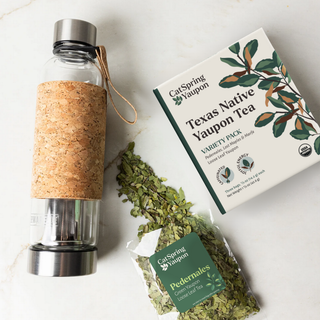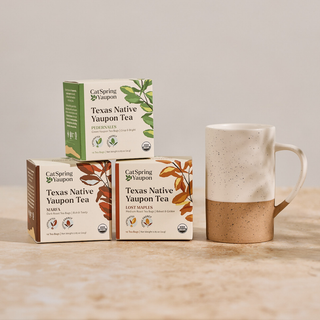Tea has been popular for centuries. Today, according to Euromonitor, about 3.7 billion cups of tea are consumed every single day. Suffice to say, the world has quite an appetite for tea leaves. With over 3000 types of tea worldwide it can be hard to know where to begin. Luckily, here at CatSpring, we have put together this guide for the best teas for beginners..
If you want to get some for yourself, we have a collection of the best teas for beginners in tea bags, loose leaf tea, or iced tea pouches.
What is the Best Tea for Beginners?
1. Yaupon Tea
One of the biggest hurdles for new tea drinkers is figuring out steeping times. Steep too long and your brew is bitter or don’t steep enough and you have lightly flavored water. Unlike other teas that are traditionally made with the Camellia sinensis plant, yaupon has unique properties. A major benefit of yaupon is that it lacks tannins that are found in many traditional teas. This means your brew won’t get bitter no matter how long you brew it (and you can even reuse the leaves). Steep your leaves as long as you want to get a perfect cup or even keep a mug refilled with hot water all day long beside you. In general, yaupon has about 25 mg of caffeine content, which is less than a normal cup of coffee (about 90 mg).
Benefits:
- Easy to brew and can be made in a variety of ways including a hot steep, cold brewed, or iced so you can find your favorite method.
- Gentle boost of energy from caffeine that is less than in a normal cup of coffee meaning you won't get jitters.
- Enjoy a subtle sweet flavor that can be accentuated with your favorite sweeteners like honey for a delicate floral note but is also delicious and refreshing all on its own.
Side Effects:
- May cause sleeplessness if consumed in large quantities all at once.
Find you love for tea with CatSpring Yaupon. It’s organic, non-gmo, kosher, sustainably grown, and naturally caffeinated.
2. Ginger Tea
This familiar flavor has been used for thousands of years as a cure for nausea and digestive problems in regions like Asia and India. Now, it is found in a myriad of food products which makes it easy to try as a beginner to tea. As a rule of thumb, one cup of ginger tea contains about 250 milligrams of ginger so aim to drink two to four cups of this tea to alleviate feelings of nausea.
Benefits:
- Makes you feel better faster than ginger ale and other sugary beverages because it contains higher concentrations of the compounds that alleviate digestive issues.
- Made using fresh ginger root which packs a punch when it comes to healing symptoms such as an upset stomach.
- Proven to reduce nausea when 1 milligram of ginger root is taken daily (based on a Thai study of pregnant women with symptoms of morning sickness).
Side Effects:
- Makes heartburn worse because it relaxes the muscle that prevents stomach bile from entering the esophagus.
3. Earl Gray
Chances are you have heard of this wildly popular Black tea blend. Flavored with bergamot oil this tea has a distinct flavor that millions of people love. You can have it as a latte, with a splash of milk and sugar, or by itself. Found easily on store shelves, you can't go wrong trying this unique tea.
Benefits:
- Caffeine helps wake you up in the morning and give you a boost of energy throughout the day.
- Easy to find because of its highly popular nature, so it can become a staple at coffee shops and tea houses.
- You can try it in a variety of ways including the well loved London Fog…ask your next barista for it…delicious!
Side Effects:
- Black tea has caffeine so just be careful to not consume too much in a day.

4. Chamomile Tea
If you are wanting to hop on the tea-before-bed-bandwagon but don't know where to start, look no further than the friendly Chamomile flower. Adding this tea to your nightly routine could infuse a myriad of health benefits into your sleep. Chamomile is primarily brewed from one of two daisy-like species of flower and commonly known for its stress-relieving properties. It’s long been believed to have health benefits though many are still under research. One benefit is supporting a healthy heart through the compound flavones which has the potential to lower blood pressure and cholesterol levels.
Benefits:
- Promotes sleep due to its chemical structure, helping you get that beauty sleep you deserve.
- Its anti-inflammatory properites have been shown to boost your immune system.
- Ease nausea and soothe your stomach.
Side Effects:
- Chamomile does make you drowsy so be aware before consuming *cue the good dreams*
5. Peppermint Tea
Peppermint tea has a signature minty flavor due to its easy brewing using mint leaves. If you have ever chewed gum or brushed your teeth, adding this tea to your daily routine should be a breeze. This menthol based flavor can help soothe your intestines and decrease bloating while also freshening your breath instantly. *Pro tip: you can also add peppermint oil to other beverages and get all the benefits.
Benefits:
- Easy to complement the flavor with ginger, honey, or fruity flavor to find a delicious cup for anytime
- Caffeine free and coming in oil or bag form, peppermint is a versatile option
- Ease headaches as peppermint is a natural muscle relaxant while the menthol increases blood flow that creates a cooling sensation.
Side Effects:
- Can worsen acid reflux by relaxing the muscles around the stomach sphincter.

6. Matcha Tea
Matcha is a powdered green tea made from ground tea leaves. Each cup of matcha contains the entire tea leaf, meaning each cup tends to have a higher concentration of the benefits of tea, including caffeine. Similar to yaupon, matcha and other traditional teas have l-theanine that trigger the release of GABA and alpha waves, both of which contribute to a relaxed sensation. Matcha tends to have a higher concentration of caffeine, around 75 mg a cup, in part due to the use of the entire tea leaf directly in the powder. This is a well-known variety of tea that you can find at many of your favorite shops.
Benefits:
- More caffeine than most other teas due to intentional shading during the end of the growing period to concentrate the caffeine in the leaves.
- Supports a healthy immune system with catechins (natural antioxidants found in plants) and the addition of polyphenols with antioxidant properties.
- Easy to enjoy a variety of ways from hot to iced to latte.
Side Effects:
- Can cause an upset stomach due to tannins if consumed on an empty stomach.
The Bottom Line
Implementing quality tea into your life doesn't have to be hard. With over 3000 different kinds of tea, there is sure to be a tea out there for you. Try out many and find if you prefer a subtle grassy flavor such as matcha, the rich flavor of black tea, or the subtle sweetness of chamomile.
If you want to get our best tasting tea for beginners, check out our organic, naturally caffeinated CatSpring Yaupon tea here.
Medical Disclaimer: This article is for informative purposes only and shouldn’t be taken as medical advice. If you have serious health-related issues you should reach out to a medical professional. While we have studied the scientific research available, this is not intended to diagnose, treat, cure, or prevent any disease.













